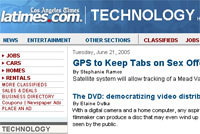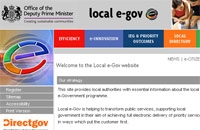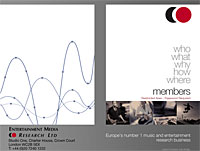 A number of people have raised concerns as to how open an organisation Ofcom is. It’s a public corporation, set up in many ways like the BBC, but it was setup with the knowledge that the UK Freedom Of Information Act (FOIA) would take effect in January 2005. This has led it to define the accessibility of the information that it produces, as it generates it.
A number of people have raised concerns as to how open an organisation Ofcom is. It’s a public corporation, set up in many ways like the BBC, but it was setup with the knowledge that the UK Freedom Of Information Act (FOIA) would take effect in January 2005. This has led it to define the accessibility of the information that it produces, as it generates it.
We’ve heard many people have applied for information and have been turned down, with the frequently cited reasons being; Not in the public interest (how broad a brush would you like sir); or Commercially sensitive (also pretty broad). Others, who have had their request granted, are nearly always pointed to Ofcom’s extensive Web site, which isn’t always the known as the quickest to locate what you want.
We’ve heard that many applications take the statutory maximum number of days (20) to respond with a reply – even when it’s a refusal. This causes us some confusion – does it really take that long for Ofcom to deduce that it is going to be refused, especially as all information is graded on creation? Ofcom’s response is that if it comes back as a refusal, they will pass it through “internal procedures” to re-examine if they can release it.
Ofcomwatch have been keeping an eye on this for some time. We spoke to Luke Gibbs from Ofcomwatch about their FOIA findings, “This is something we’ve been looking at over the last year. It appears to us that Ofcom is following the letter of the FIOA, rather than the spirit. We’ll be doing further research into this later in the year.”
![]() Russ Taylor, Ofcomwatch co-founder reveals their finding …
Russ Taylor, Ofcomwatch co-founder reveals their finding …
Ofcom was kind enough to provide OfcomWatch with some brief midyear statistics on how it is progressing with the Freedom of Information Act (FOIA), implemented in the U.K. on January 1, 2005. For previous Ofcomwatch posts on this issue, check Ofcomwatch’s Brief Guide to The Freedom of Information Act and its continuation.
* Ofcom is averaging about 130 FOIA requests per month ~ about 800 so far.
* About 70% of FOIA requests are granted. Common reasons for denying a FOIA request: (i) the data is commercially confidential and (ii) the request is overly-broad and could not be completed within the 18 hour / 450 GBP limit.
* 98.5% of FOIA requests are processed within the statutory time limit. Interesting point: Grants are reportedly swifter than denials, because Ofcom internally review proposed denials to determine whether they can be partially granted.
* Ofcom do not categorise FOIA requests because that would lead to prioritisation, which would be ‘wrong and unfair’.
* Overall, Ofcom commented that the FOIA — in ‘philosophical terms’ — is ‘both welcome and in line with our view of the public’s right to expect transparency and accessibility from public bodies’. However, Ofcom noted that FOIA is something of an operational burden because of the volume of requests received.
* * *
![]() So, that’s Ofcom’s take (and progress) on FOIA so far. FOIA is of course a new area of U.K. law and we expect all public bodies–not just Ofcom–to struggle with implementation. OfcomWatch will take a closer look at FOIA in January 2006, as the first-year of the FOIA’s applicability to Ofcom draws to a close.
So, that’s Ofcom’s take (and progress) on FOIA so far. FOIA is of course a new area of U.K. law and we expect all public bodies–not just Ofcom–to struggle with implementation. OfcomWatch will take a closer look at FOIA in January 2006, as the first-year of the FOIA’s applicability to Ofcom draws to a close.
But, overall (and interim) statistics only tell part of the story:
* We’ve heard some interesting stories about FOIA from some of you, and we’ve filed less than a handful ourselves. Keep sharing your FOIA stories (mail to: [email protected]).
* I suppose we’ll also receive legal clarifications on just how powerful a tool FOIA is as some denials (whether by Ofcom or by others) are tested on appeal.
* Finally, FOIA is only one element of ‘better regulation’ that is being implemented across the U.K. Better regulation means that FOIA requests should be minimised because public bodies otherwise maintain useful websites and publication schemes, always with an eye toward satisfying their ultimate boss: the citizen-consumer. So, we always want your comments on how Ofcom can function better in this regard.
Stay tuned…
 Nortel NT and BB Mobile are chuffed to bits to have achieved what they claim is the world’s “first seamless handoff of voice and data services between a third generation (3G) cellular network operating on the 1.7 GHz radio frequency band and a wireless local area network (LAN)”.
Nortel NT and BB Mobile are chuffed to bits to have achieved what they claim is the world’s “first seamless handoff of voice and data services between a third generation (3G) cellular network operating on the 1.7 GHz radio frequency band and a wireless local area network (LAN)”. In those trials, boffins were able to notch up Japan’s first 14.4 million bits per second (Mbps) wireless data transmission via the 1.7 GHz radio frequency band for mobile communications and Nortel’s high-speed downlink packet access (HSDPA) technology.
In those trials, boffins were able to notch up Japan’s first 14.4 million bits per second (Mbps) wireless data transmission via the 1.7 GHz radio frequency band for mobile communications and Nortel’s high-speed downlink packet access (HSDPA) technology. A note at the end of the press announcement: “Certain information included in this press release is forward-looking and is subject to important risks and uncertainties. The results or events predicted in these statements may differ materially from actual results or events….”
A note at the end of the press announcement: “Certain information included in this press release is forward-looking and is subject to important risks and uncertainties. The results or events predicted in these statements may differ materially from actual results or events….” As you probably know, we’re big fans of the Internet-based telephony application Skype, and when we got our grubby hands on an imate JAM PocketPC phone (with SanDisk Wi-Fi card), we couldn’t wait to start reaping those free VoIP calls with Skype for Pocket PC, v1.1.0.6.
As you probably know, we’re big fans of the Internet-based telephony application Skype, and when we got our grubby hands on an imate JAM PocketPC phone (with SanDisk Wi-Fi card), we couldn’t wait to start reaping those free VoIP calls with Skype for Pocket PC, v1.1.0.6. Using Skype to place voice calls to Skype users or via SkypeOut was simplicity itself, with almost all attempts to connect calls successful first time. Sadly, once connected, things weren’t quite so rosy.
Using Skype to place voice calls to Skype users or via SkypeOut was simplicity itself, with almost all attempts to connect calls successful first time. Sadly, once connected, things weren’t quite so rosy. But I battled on, and found subsequent Skype calls to be a veritable potpourri of good, bad and indifferent, with more terrible calls than good ones.
But I battled on, and found subsequent Skype calls to be a veritable potpourri of good, bad and indifferent, with more terrible calls than good ones. As we reported in March 2005, there’s free Skype access provided at hundreds of airports, railways stations etc through The Cloud’s network, which – in theory – means you could be ringing up associates worldwide for nowt.
As we reported in March 2005, there’s free Skype access provided at hundreds of airports, railways stations etc through The Cloud’s network, which – in theory – means you could be ringing up associates worldwide for nowt. In a deluge of announcements, iRiver has paraded four new flash-memory based music players before the SEK exhibition in Seoul this week.
In a deluge of announcements, iRiver has paraded four new flash-memory based music players before the SEK exhibition in Seoul this week. The second player is the H10 Junior, a flash-based Mini Me version of the popular H10 player, which some patronising marketing genius has declared as “One For The Ladies”.
The second player is the H10 Junior, a flash-based Mini Me version of the popular H10 player, which some patronising marketing genius has declared as “One For The Ladies”. Wrapping up iRiver’s latest product shifting marathon is the T20 and T30 flash music players.
Wrapping up iRiver’s latest product shifting marathon is the T20 and T30 flash music players. A survey by technology researchers IDC revealed that passengers aren’t too keen on the prospect of spending long flights listening to fellow passengers bellowing into their mobile phones.
A survey by technology researchers IDC revealed that passengers aren’t too keen on the prospect of spending long flights listening to fellow passengers bellowing into their mobile phones. The growth of clever-clogs smartphones phones like the i-mate JAM and PalmOne Treo would allow connected passengers to check their email and surf the web during flights.
The growth of clever-clogs smartphones phones like the i-mate JAM and PalmOne Treo would allow connected passengers to check their email and surf the web during flights. In a bold, nay brave, nay reckless move, the LA Times offered readers the chance to edit its editorials on their website via a “Wikitorial”.
In a bold, nay brave, nay reckless move, the LA Times offered readers the chance to edit its editorials on their website via a “Wikitorial”. At midnight, the site managers left the doors to the candy store wide open and headed home for the night, presenting an irresistible temptation to online wagsters to do their worst, free from moderation.
At midnight, the site managers left the doors to the candy store wide open and headed home for the night, presenting an irresistible temptation to online wagsters to do their worst, free from moderation. Apple is elbowing its corporate presence onto Glastonbury Festival with a launch at world famous music event later this week, according to a report in MacWorld.
Apple is elbowing its corporate presence onto Glastonbury Festival with a launch at world famous music event later this week, according to a report in MacWorld. This will feature winners of a competition run between iTunes and Hit40UK which asked budding musos to create a five-song iMix of tracks they felt appropriate for kick-starting the Dance stage this year.
This will feature winners of a competition run between iTunes and Hit40UK which asked budding musos to create a five-song iMix of tracks they felt appropriate for kick-starting the Dance stage this year. These take the form of fan-tempting collectible iTunes cards stuffed full of band-specific artwork and special codes that let mustard-keen fans download tracks from a specific artist or album.
These take the form of fan-tempting collectible iTunes cards stuffed full of band-specific artwork and special codes that let mustard-keen fans download tracks from a specific artist or album. eGov Monitor is reporting that pressure is building for a national campaign to spur demand for eGovernment, with the government likely to be asked to fund a large-scale marketing campaign to promote online public services.
eGov Monitor is reporting that pressure is building for a national campaign to spur demand for eGovernment, with the government likely to be asked to fund a large-scale marketing campaign to promote online public services. Although growth in the take-up of some e-services has been promising, the eGov article states that the need to drive up public usage across the board remains a major concern for the UK’s eGovernment programme.
Although growth in the take-up of some e-services has been promising, the eGov article states that the need to drive up public usage across the board remains a major concern for the UK’s eGovernment programme. It’s not yet confirmed, but it appears that Google is preparing to challenge PayPal with its own online electronic payment system, rumoured to be called ‘Google Wallet’.
It’s not yet confirmed, but it appears that Google is preparing to challenge PayPal with its own online electronic payment system, rumoured to be called ‘Google Wallet’. Sellers who run auctions on eBay are major buyers of Google’s ads, which appear alongside search results, so it’s not surprising to see the company angling in for a slice of the payment action.
Sellers who run auctions on eBay are major buyers of Google’s ads, which appear alongside search results, so it’s not surprising to see the company angling in for a slice of the payment action. According to a survey by Entertainment Media Research, UK legal digital music downloads have grown by a thumping great 75% in a year.
According to a survey by Entertainment Media Research, UK legal digital music downloads have grown by a thumping great 75% in a year. These findings are supported by the news that legal digital downloads have accounted for 8% of Coldplay’s recent album sales in the US – the biggest share for any new release to date.
These findings are supported by the news that legal digital downloads have accounted for 8% of Coldplay’s recent album sales in the US – the biggest share for any new release to date. Two fifths of those surveyed preferred digital downloads because they were only interested in one or two tracks, while 29% downloaded music to sample an album before purchase.
Two fifths of those surveyed preferred digital downloads because they were only interested in one or two tracks, while 29% downloaded music to sample an album before purchase.